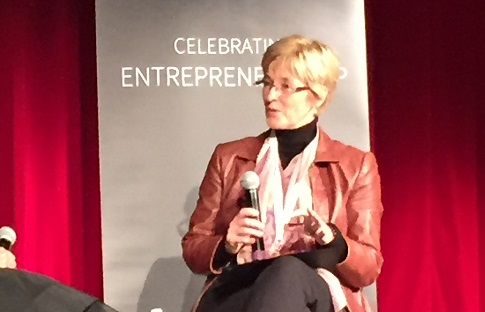Big data and environmental sustainability have become hot topics in recent years. New Brunswick’s Remsoft has been analyzing big data for decades, a foresight that has made the company a world leader in land and forestry management.
The large volume of data relevant to a particular business or sector can be analyzed for insights that lead to better business decisions and higher profits.
Andrea Feunekes, Remsoft’s CEO and president, started the Fredericton company 24 years ago with her husband, Ugo Feunekes, Remsoft’s chief technical officer.
Feunekes Honoured by Startup Canada
Over the last five years, Remsoft’s growth has accelerated, she said, thanks to its early development of a software platform that allows computational analysis of a company’s information.
The software analyzes a client’s forests. The age, size, growth rate and other aspects of trees are examined in order to predict the best times to do simple things like get logs to market or predict which of thousands of trees may fall and damage a power line.
“The intersection of the environment and business is key for us,” Feunekes said. “Vegetation management is big.”
Canadian clients must be able to plan ahead as trees in Canada’s cold climate can take up to 40 years to grow, compared with five to seven years in Brazil.
“In Canada, you’re planting trees for a market that will occur in the next generation,” Feunekes said.
“We help people think about where they need to be in the future. Businesses need to make money today, but they also need to ensure they are moving in the direction they want to move in.”
Increasingly, that direction is dictated by the need for sustainability. According to the United Nations, around one billion more people will be added to the global population over the next 10 years. Feunekes said that figure makes sustainability even more essential.
“We have to become more efficient and sustainable with the use of resources.”
Remsoft helps with supply chain planning. Efficiency in the supply chain reduces machine use, emissions and the cost of trucking trees.
“We want to minimize what we take from the land and maximize the return,” Feunekes said.
Trees are an important part of sustainability, as a great deal of carbon is stored in wood.
Trees tend to grow fast when young, when they also store carbon at a greater rate. When the number, age and growth rates of trees are known, it’s possible to calculate how much carbon is being stored by a forest.
Companies may be able to balance the carbon held by their trees against the carbon emissions made by their mills to become carbon-neutral. They may also sell their trees’ carbon storage as a carbon credit.
Remsoft helps clients with these evaluations. Feunekes believes carbon taxes and carbon markets will soon become increasingly important.
She said Remsoft is the global leader in its field, with many blue-chip clients attracted by the company’s strengths in business and technology. Less than five per cent of Remsoft’s business is regional, and only 25 per cent is Canadian. Most sales are global.
To meet demand, the sales team, which is based out of Toronto, has been increased in the last few months.
The company’s base in Atlantic Canada has allowed it to benefit from the strong forestry and computer science faculties at the University of New Brunswick, where Feunekes gained her master of science in forestry.
The distance from many key markets has been a challenge. Feunekes said it is also getting harder to find good talent of all kinds in Atlantic Canada.
“We need to grow our population. We need to bring in more people. … We want to entice people from elsewhere to come to Atlantic Canada.”










